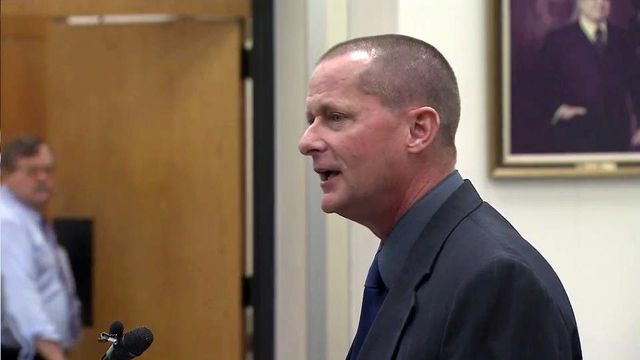Water regulator defends return of grants
State water chief Tom Reeder defended his decision to return $580,000 in federal grants before the state mining commission Friday.
Posted — UpdatedReeder said the studies the grants were to pay for would be "useless" to regulators because they would have tested only surface water, not groundwater, and because the testing would have been completed too far in advance of the start of natural gas drilling in North Carolina.
"These studies have a shelf life. If you completed a baseline study and you didn’t start the (hydraulic) fracturing for three, four, five years, the baseline study would probably not be very valuable," Reeder said. "You'd have to go out and do another one because you want the most current data on what that environment looked like precisely before you started those fracturing operations. Otherwise, you’re going to be comparing apples to oranges."
Reeder said the grants did not include any coordination with the Mining and Energy Commission or any communication of the results with that board.
"It wasn't really even being done to benefit the state of North Carolina. It was done to benefit the U.S. Geological Survey and the Environmental Protection Agency," he said.
Reeder also chastised the media for "misperceptions" of and "accusations" about his decision to return the money.
"One of the things I’ve been amused about in all the media this week is all the public concern for the financial well being of the Division of Water Resources – we’re 'cash-strapped,' we 'don’t have any money,'" he said. "Well, let me tell you, that’s my job to worry about that, and we’re in very good financial conditions. Nobody has to worry about that."
Reeder said the EPA grant would have paid two salaries for personnel "we don't need. We have enough people in DWR today."
"When you want us to do a study, we’ll be happy to do you a study, and we’ll do a study when you want it done, where you want it done. We’ll look at what you want us to look for, and guess what? We’re even going to look at groundwater for you," he said. "So, we’re fine. We have experts that can do that for you, and we’ll do it for a good bit less than $222,000."
Occasionally pounding his fist on the podium, Reeder said taking the money would have been a waste of public dollars.
"One of my favorite arguments I’ve heard this week is that nobody’s ever returned a grant from EPA before," he said sarcastically. "Really? So what? That’s an argument?
“Maybe if other states had the same level of fiscal responsibility that (DENR) Secretary (John) Skvarla has instituted in DEMLR (the Division of Energy, Mining and Land Resources), maybe we wouldn’t have over $1 trillion in federal debt today.”
The Mining and Energy Commission had not been informed about the grants' submission, nor their return.
Commission Chairman Jim Womack was quick to reassure Reeder that the board has full confidence in his decision.
"I don't know of anyone who was counting on this grant to support MEC activities," Womack told him. "I don't know of anyone that's upset on our end."
Commissioner Ray Covington said it was good to hear the explanation but added it was "embarrassing" to learn about the issue from constituent emails, and Commissioner George Howard pointedly requested more coordination in the future.
"Before grant proposals in our purview are submitted, could DENR come tell us about it?" Howard asked Reeder.
Therese Vick with the Blue Ridge Environmental Defense League signed up to comment at Friday's meeting. She said Reeder's address left her with more questions than answers.
"I don’t know why the information they would have obtained from the study would not be useful," Vick said. "I always think gathering data on water quality is useful, especially if you’re proposing such a heavily industrial development in a highly populated county that could affect downstream surface water users."
Vick called Reeder's presentation "glib" and "combative" and said she's skeptical about his claim that the division can handle increased testing demands with fewer people and resources.
"Will the money be there? I doubt it. That’ll be the excuse when it comes time to do it – 'We don’t have the money.' – and if the legislature doesn’t want to give them the money, it won’t be done," she warned. "Now that we've turned this grant down, you won’t even get a start, because that would have been a good start, anyway."
Vick is also concerned that the decision to return the money might affect future grant funding from the EPA.
"All bets are off with DENR now,” she said. “DENR has an agenda, and it’s not necessarily environmental protection – not under this new regime."
Related Topics
• Credits
Copyright 2024 by Capitol Broadcasting Company. All rights reserved. This material may not be published, broadcast, rewritten or redistributed.





